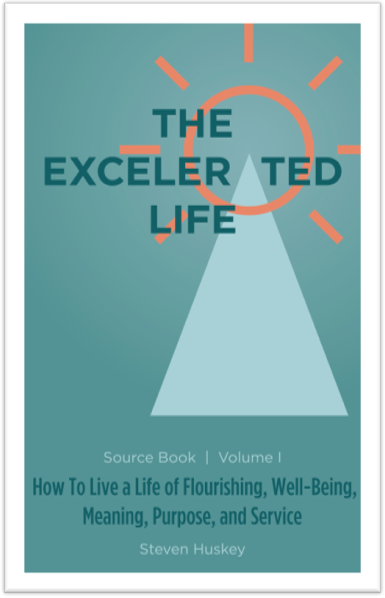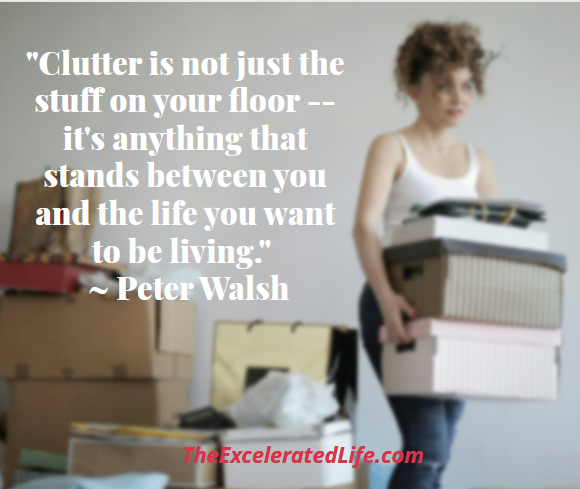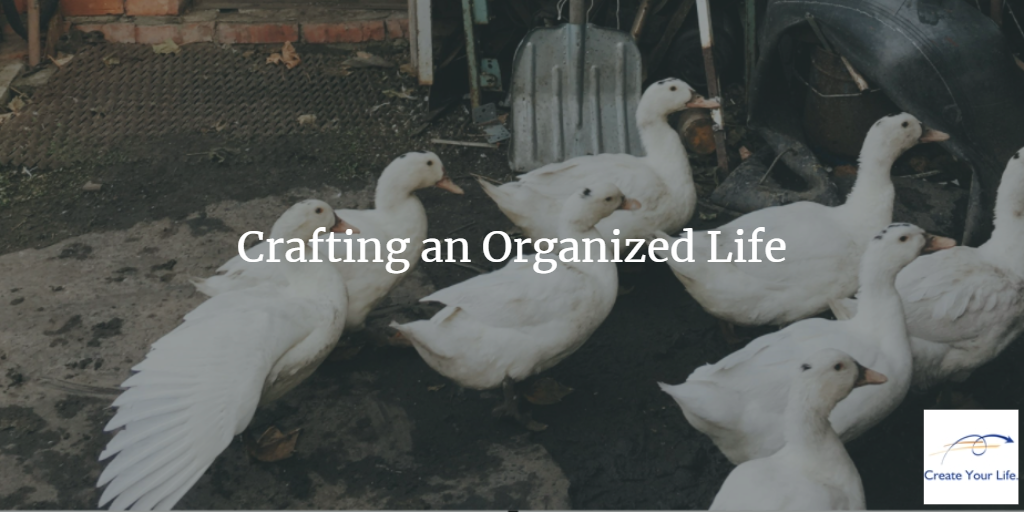If you’re feeling tied down by too many possessions to clean and repair and care for, things that you never use, now may be a good time to consider becoming clutter-free and well-enough organized – able to find what you need when you need it.
Learning To Be Well-Enough Organized
Once upon a time, there was a man (in fact, it was me!) whose home and car and garage and life were full of clutter. I accumulated some things that were important, even precious to me. And I accumulated papers and books and magazines and household items and cards and pictures and . . . well, you get the idea.
Back then, I wasn’t familiar with the concept of clutter or of decluttering and organizing. Here are just a few examples. I had two large trash bags of beer huggies. I collected them for years, picking up a new one whenever we traveled to a new place, or anytime I saw a cool one that I fancied. I had many years’ worth of “Organic Gardening” magazines that I had subscribed to in case I ever became an organic gardener. I also had a few boxes of National Geographic magazines that I found in the attic of a house we lived in. I had a dozen or more wind chimes hanging on my back porch. Then, there were the thirty or so record albums that I never listened to. And you already know about my books!
That was just the tip of the iceberg. My car was littered with stuff. My garage was littered with stuff. My attic was littered with stuff. It wasn’t the car or garage or attic or home of a hoarder. Nothing too extreme. In fact, because it wasn’t extreme or disruptive, I (and my family) lived with it for years.

At some point, though, I learned about home organizing and even considered becoming a professional organizer. As I read and studied the concepts of organizing, I began getting my own possessions cleared out and under control. I never helped people as a professional organizer, but the things I learned became the basis for the Excelerated Organization™ practice. Here, we are aiming to be “well-enough organized”, to be “able to find what you need when you need it”.
See the Impact of Clutter
Now, you likely don’t have 200 beer huggies or years of old magazines stuffed in boxes but you may have some cluttered areas of your life. Some of the time, you may not even be aware of the impact clutter has.
But are you occasionally late paying a bill because it got lost under a stack of junk mail? Do you have a pile of coupons that you never take with you to the grocery, most of which are expired anyway? Do you have files or papers or books that you aren’t using for work stored on top of your desk? Can you see the top of your desk? Do you have a closet filled with clothes that you never wear? Do you ever miss deadlines or appointments because you keep multiple calendars? Are you hanging on to broken appliances or toys or tools because you plan to fix them “someday”? Or do you have your own unique personal types of clutter?
Most likely, you are not overwhelmed by clutter. But that doesn’t mean it isn’t having an impact on your life. Could you use a bit of cleanup, removing non-essentials from your life and your space?
As Within, So Without
“If you wish to simplify your inner self, arrange your rooms sparingly.” [Masuno]
Our external world is a reflection of our internal world. If your external world is peaceful and ordered, then your inner life is peaceful and ordered. And when your internal world is chaotic, your external world is likely to be a mess. And vice versa.
The interesting thing is this – when you change one, the other changes. If you “clean up your act”, you will see your environment becoming more orderly and organized. If you get busy straightening out your environment, your thoughts and emotions become less chaotic and disorganized.
You can change either one to affect the other. However, it is generally easier to change the external part – to bring order to your external life and your environment. As Shunmyo Masuno advises, “to simplify your inner self”, straighten up your rooms. It’s a good place to begin crafting your organized life.
Keep these ideas in mind as you begin your organizing journey – and it is a journey, not a destination. It takes ongoing effort, not “one and done”.
Have a Plan
Have a plan. Don’t jump in and start sorting through stuff or throwing things away without first having an idea of what you want as the end result. Ask yourself how well will you accomplish it all, without a plan?
Try this. Pick one area that needs work. If you’re lucky, you may only have one area but I suspect most of us will need to choose from several. You can choose the room that needs the most work, or the most noticeable one, or use any method that works for you. But pick one.
Now, visualize what the room or area will look like once you have decluttered and straightened it. Hold that in your mind. What’s the first thing you’ll do to accomplish that vision? What’s next? And next? There’s no need to write down the steps, but some people find that helpful. If you’re one of them, by all means, write down your plan. But have a plan, either written or in your head, to get started and to stick with till you’re through.
Keep In Control
Don’t let the magnitude of the task overwhelm you. If you have a really messy room, desk, or garage, it may feel like too big of a job to try to clean it up, so you’re tempted to just let it stay the way it is. That would be a mistake.
If that happens to you, go back to your plan. “Yard by yard,” the saying goes, “it’s hard. But inch by inch, it’s a cinch!” You don’t have to do everything in one overwhelming session. Try breaking your decluttering job into small increments that you can do in a fixed amount of time, say one hour or thirty minutes. If that still seems overwhelming, do 10 or 15 minutes per day, until you’ve cleaned up that area.
Make a promise to yourself that you’ll take your small step each day. Soon, you’ll begin to see some progress and that motivates you to keep going. Just don’t keep adding to the clutter that is already there!
Use Your Team
If you’re feeling overwhelmed because you think you have to do this all by yourself, think again. Use your team.
If you have other family members, get them involved. Assign different tasks to your spouse and children, based on their abilities. If you have roommates, set up a task list (remember your plan?) so everyone helps out.
If you have no one else in your home, consider asking a friend (you can offer to do the same for them) or hire outside help.
Watch The Time
Remember Parkinson’s Law: Work expands to fit the time allotted.
My wife, Rebecca, had an hour before she had to leave for an appointment and she decided to use that time to straighten up her desk. She jumped in and worked for an hour and had a presentable desk by the time she left. I had two hours free and decided to organize my desk. I set to work and when my time was up, I too had a nicely organized workspace.
Do you see the difference? We both ended up with tidy desks, but it took me twice as long. Not necessarily because I’m that much slower, but mostly due to Parkinson’s law.
When you set out to take one of your organizing steps, decide in advance how much time you’ll need and shoot for that deadline. You may be surprised at how much you can get done.

Don’t Organize the Clutter
Well-organized clutter is still clutter. Watch for the trap of using cute bins or tubs or other organizing containers before you’ve cleaned out the mess.
Here’s a way to begin. Look for and remove these things right now:
Actual trash.
Damaged items.
Expired foods, spices, or medicines.
Clothes that no longer fit.
Those things you never use.
Stuff you’re keeping “just in case”.
Extras or duplicates. (But not your reserves.)
Materials for hobbies you’re no longer interested in.
Stuff that brings up bad memories.
Socks with no mates.
Hole-y underwear.
Old receipts.
Blurry photos and duplicates.
Empty boxes.
Dried-up makeup.
Instruction manuals and warranties for things you no longer have.
Dried up pens and markers.
Unused apps.
Digital clutter.
Those things you don’t know why you have.
Actions
OK, you have a plan. Your team is in place. You’ve set a time limit so you aren’t overwhelmed. You’re ready to start becoming “well-enough organized.” Let these actions help you get going.
- Before you set something down, ask yourself, “Is this where it belongs?” If the answer is “No”, take the extra minute to put it in its home.
- Create a home for new things you acquire before you bring them in.
- Get in the habit of writing things down rather than trying to remember them.
- Establish routines to help you get things done with less effort.
- Decide to purchase items only to replace items that are worn out.
- Do not return papers to your inbox once you remove them. Decide what needs to be done by using the TRAF method: Trash it, Refer it to the person who can move it along, Act on it, or File it.
- Open your mail near a trash can or recycle bin. Toss junk mail immediately. File bills in a “To Pay” folder. Put magazines, newsletters, catalogs etc. in their designated location.
- Set up a tickler file system.
8.1 Label twelve file folders January through December. Label thirty-one file folders 1 through 31. Put the month files in order beginning with the current month. Put the 31 daily files behind the month folder. Move the current month’s folder to the end of the group. Now move the daily folders up through the current date behind the folder for next month. This leaves the daily folder for tomorrow as the first folder in the group. Your system is now set up for the current date.
8.2 Each day, check the current day’s folder and move it behind the last daily folder which is behind the next month’s folder. At the beginning of the new month, check the new month’s folder and distribute any items to the daily folders. Move the new month’s folder to the end of the group.
8.3. Place reminders in the appropriate daily folder for events and actions to be taken on that day and then forget them. You’ll be automatically reminded of the actions when you check the folder for that day. Place reminders for future events and actions in the appropriate monthly folder. On the first day of the month, distribute the items in the monthly folder to the appropriate daily folder. - Don’t use a separate file folder for every monthly bill, such as telephone, gas, electricity, etc. Set up twelve monthly folders and store all the bills and receipts for each month in its folder. At the beginning of the month, remove and shred the items from last year and begin the month with an empty folder. Use the same technique for e-mails.
- Clean out your medicine cabinet. Throw away leftover prescriptions and any prescription or over-the-counter medication that is past the expiration date.
Craft Your Organized Life
Why did I need 200 beer huggies? Why did I keep years’ worth of old magazines that I never read? And why did I have stacks of old newspapers? When I thought about it, I didn’t have any good answers. I didn’t need to keep any of those things. It was really no effort to let them go. And there was a certain sense of freedom that came with cleaning them out.
If you’re feeling tied down by too many possessions to have to clean and repair and care for, things that you never use, now may be a good time to consider becoming clutter-free and well-enough organized – able to find what you need when you need it. And if you need additional help, take a look at The Organizing Excelerator for principles, strategies, and actions to help you become better organized and bring more order into your life. It’s one more step in embracing your Excelerated Life™!
How do you keep well-enough organized?
What’s one step you could take to get a little better?
Share your experience by leaving a comment below.
Excelerated Organization™ — being clutter-free and well-enough organized (able to find what you need when you need it) — is one practice for creating your Excelerated Life ™, a life of flourishing and well-being, and a life of meaning, purpose, and service.
Read more about the Excelerated Life™.
Resources:
Huskey, Steven. The Organizing Excelerator. 2008, 2018, 2020. PDF file.
https://theexceleratedlife.com/wp-content/uploads/2020/02/Organizing-Excelerator.pdf
Masuno, Shunmyo. The Art of Simple Living. New York: Penguin Life Books, an imprint of Penguin Random House LLC, 2009.


